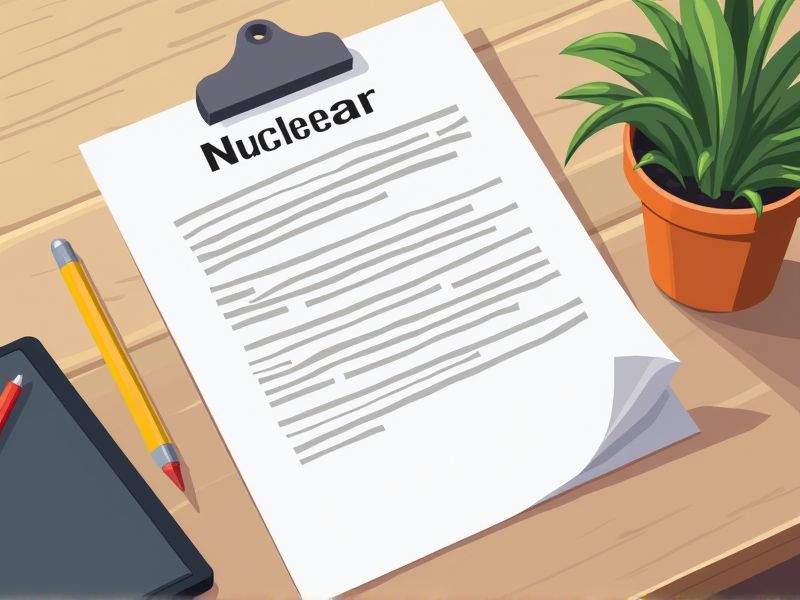
Nuclear Technicians play a crucial role in maintaining the safety and efficiency of nuclear facilities, which necessitates specific certifications. These credentials ensure they have the necessary skills to handle complex equipment and follow safety protocols to mitigate risks. Regulatory bodies require certifications to uphold industry standards and ensure public and environmental safety. Here are some important certifications you may need as a Nuclear Technician.
NRC Nuclear Reactor Operator License
Obtaining an NRC Nuclear Reactor Operator License ensures that a nuclear technician is fully equipped to operate a reactor safely, reducing the risk of accidents. Licensed operators demonstrate a comprehensive understanding of nuclear physics, systems operation, and emergency protocols. This certification is critical for compliance with federal regulations, ensuring the facility meets stringent safety standards. Licensed technicians can enhance the overall efficiency and reliability of nuclear power operations.
Radiation Protection Technologist Certification
Radiation Protection Technologist Certification ensures that nuclear technicians have the necessary expertise to monitor and control radiation exposure, crucial for maintaining safety standards. This certification mandates comprehensive training, equipping technicians with practical skills to identify and mitigate potential radiation hazards effectively. In absence of such certification, nuclear environments would face increased risk of radiation incidents due to lack of standardized knowledge and procedures. It reinforces public trust in nuclear operations by demonstrating a commitment to skilled governance over radiation safety measures.
Certified Health Physicist (CHP)
Certified Health Physicists (CHPs) play an essential role in ensuring the safety of nuclear technicians by systematically evaluating radiation exposure levels and implementing effective protection protocols. Their expertise in radiation physics and safety regulations helps prevent hazardous incidents, protecting both personnel and the environment. They provide advanced training and guidance, equipping nuclear technicians with the knowledge to handle radioactive materials safely. Regulatory bodies require adherence to safety standards, and CHPs help maintain compliance, reducing the risk of legal and operational repercussions.
Radiation Safety Officer (RSO) Certification
Radiation Safety Officer (RSO) Certification ensures that nuclear technicians possess the necessary knowledge to manage and mitigate radiation risks effectively. This certification enables technicians to implement safety protocols, minimizing radiation exposure to personnel and the environment. As regulatory bodies mandate compliance with safety standards, having certified personnel helps organizations meet legal and safety requirements. Ensuring technicians are RSO certified enhances public trust and confidence in nuclear operations by demonstrating a commitment to safe practices.
Certified Nuclear Materials Technician
Having a Certified Nuclear Materials Technician ensures proper handling and management of radioactive materials, reducing the risk of contamination and exposure. Their expertise aids in maintaining regulatory compliance, avoiding legal and financial consequences for nuclear facilities. These technicians play a crucial role in monitoring and controlling radiation levels, safeguarding both workers and the environment. Precise record-keeping and inventory management by certified technicians prevent nuclear material theft or misplacement, enhancing overall safety.
Industrial Radiography Certification
Industrial radiography certification ensures that nuclear technicians possess the requisite knowledge and skills to safely handle and operate radiographic equipment used in inspecting materials and structures. Mastery of safety protocols minimizes the risk of radiation exposure, thereby protecting both technicians and the environment. Certified technicians contribute to the assurance of structural integrity in nuclear facilities, reducing the chances of catastrophic failures. Consistent certification standards across the industry promote quality and reliability in nuclear operations and maintenance practices.
Nuclear Instrumentation Certification
Obtaining Nuclear Instrumentation Certification ensures that a nuclear technician possesses the necessary specialized knowledge to handle and operate complex nuclear equipment safely. This certification minimizes the risk of equipment malfunction or misuse, which could lead to potentially hazardous situations. Certified technicians are essential to maintaining regulatory compliance as nuclear facilities must adhere to strict safety standards set by government agencies. Certification also enhances the technician's employment opportunities and career advancement prospects within the nuclear industry, reflecting their commitment to maintaining safety and operational excellence.
Nuclear Safety Management Certification
Nuclear Safety Management Certification is crucial for nuclear technicians to ensure adherence to stringent safety protocols, minimizing the risk of accidents and radiation exposure. It enhances technicians' understanding of complex nuclear systems, leading to improved operational efficiency and equipment maintenance. The certification also helps technicians stay updated with evolving safety standards and regulatory requirements. Certified technicians contribute to fostering public trust in nuclear energy by demonstrating competence and commitment to safety.
Quality Assurance in Nuclear Facilities Certification
Quality Assurance in Nuclear Facilities Certification is needed for nuclear technicians as it directly impacts the safety protocols, ensuring operational reliability. A certified technician adheres to strict regulations, reducing the risk of nuclear accidents or malfunctions. Consistent training and evaluation enhance technicians' competencies, fostering a culture of continuous improvement in safety measures. Certification also strengthens public trust in nuclear energy by demonstrating a commitment to high standards.
OSHA Nuclear Safety Training Certification
OSHA Nuclear Safety Training Certification equips nuclear technicians with the necessary skills to recognize and handle potential hazards in their work environment, thus reducing the likelihood of accidents. Compliance with this certification ensures adherence to industry regulations, minimizing legal and financial liabilities for employers. Informed technicians contribute to a safer workplace, which facilitates consistent and uninterrupted nuclear plant operations. By having certification, technicians demonstrate their competence and commitment to safety standards, enhancing their professional credibility.
Summary
When you, as a Nuclear Technician, obtain additional certifications, your expertise and credibility in the field are significantly enhanced. Employers are more likely to recognize your advanced skills, often leading to increased job opportunities and potential for higher income. Your certification also contributes to maintaining high safety standards in nuclear facilities, reducing the risk of operational errors. As a result, the industry overall benefits from a more skilled and competent workforce, ensuring efficient and secure nuclear operations.
